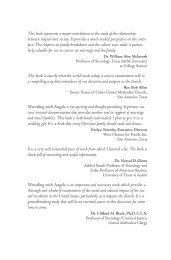Over the Rainbow: - Wrestling With Angels
Over the Rainbow: - Wrestling With Angels
Over the Rainbow: - Wrestling With Angels
Create successful ePaper yourself
Turn your PDF publications into a flip-book with our unique Google optimized e-Paper software.
Risky Behaviors Cause Concern (Byrd. 2010).<br />
In <strong>the</strong> June 2003 edition of <strong>the</strong> Journal of <strong>the</strong> American Public Health, health risks<br />
associated with homosexual practices were highlighted. Bad news was reported in one article<br />
after ano<strong>the</strong>r. Dr. A. Dean Byrd, Vice President of NARTH, summarized <strong>the</strong>se concerns .<br />
Beryl A. Koblan and associates reported on alarming data from Boston, Chicago, Denver, New<br />
York, San Francisco and Seattle involving HIV-negative homosexual men who reported<br />
engaging in anal sex with one or more partners in <strong>the</strong> previous year. Among 4,295 men, 48%<br />
reported unprotected receptive anal sex and 54.9% reported unprotected insertive anal sex.<br />
Unprotected anal sex was significantly associated with drug and alcohol use.<br />
A study by Daniel H. Ciccarone and associates indicated that sex without disclosure of HIV<br />
status is common among persons living with HIV. Their study reported 45,300 gay or bisexual<br />
men, 8,000 heterosexual men and 7,500 women who were HIV infected, were also engaging in<br />
sex without disclosure of <strong>the</strong>ir HIV status.<br />
David J. Malebranche reported on a US metropolitan study of six sites that reported 93%<br />
of African American men who were HIV infected did not know <strong>the</strong>y had <strong>the</strong> virus.<br />
Malebranche’s study contradicted <strong>the</strong> view that ‘coming out’ is associated with better mental<br />
health, responsible behavior and lower rates of HIV infection. African-American men who<br />
disclosed <strong>the</strong>ir homosexuality had a higher HIV prevalence (24%) and engaged in more<br />
unprotected anal sex (41%) than those who did not disclose (14% and 32% respectively).<br />
In 1999, J. Michael Bailey commented on <strong>the</strong> research on homosexuality and mental illness<br />
in <strong>the</strong> Archives of General Psychiatry. He concluded “Homosexual people are at a substantially<br />
higher risk for some forms of emotional problems, including suicidality, major depression and<br />
anxiety disorder”. This conclusion was corroborated by a large, well-conducted study from <strong>the</strong><br />
Ne<strong>the</strong>rlands that was published in Archives of Psychiatry, 2001. The Dutch society is recognized<br />
as one of <strong>the</strong> most gay tolerant in <strong>the</strong> world. Yet <strong>the</strong> risk for mental illness by those engaging in<br />
homosexuality is significantly higher than among heterosexuals in that country.<br />
Dr. Byrd, in response to <strong>the</strong> above research, expressed concern that <strong>the</strong> authors failed to<br />
conclude that ” homosexuality is nei<strong>the</strong>r innate nor immutable,” that” homosexual men and<br />
women have a choice in how <strong>the</strong>y respond to <strong>the</strong>ir attractions,” and “that homosexuality<br />
represents an adaptation – not an identity.” Byrd criticized many of <strong>the</strong> authors for being<br />
preoccupied with ‘homophobia’ without allowing room for o<strong>the</strong>r hypo<strong>the</strong>ses. Byrd stated,<br />
“Perhaps it is not homophobia but misquided activism that is responsible for <strong>the</strong> current health<br />
<strong>Over</strong> <strong>the</strong> <strong>Rainbow</strong>: The Gay Battle for Social Reorganization of America. 2010<br />
Dr. M. L. Coppock<br />
18 | P a g e




